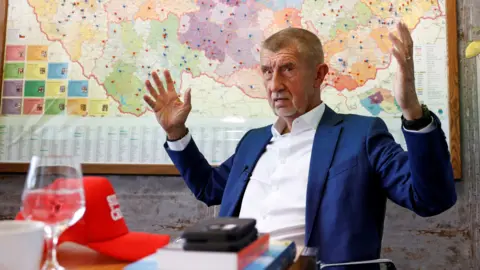Billionaire businessman Andrej Babis has won parliamentary elections in the Czech Republic, although his populist ANO party fell short of an overall majority.
ANO received just under 35% of the vote, earning them 80 seats in the 200-seat lower house – up from 72 seats four years ago, according to preliminary results.
Babis – who served as prime minister from 2017 to 2021 – is expected to be invited to lead talks on forming a new coalition.
This is a historic success, Andrej Babis announced to cheering supporters at the ANO headquarters in the suburbs of Prague.
He entered the building holding aloft a Bluetooth speaker blasting a remix of the 1981 hit 'Sarà perché ti amo' by the Italian pop trio Ricchi e Poveri.
The same song resounded across the stage as he accepted the applause. Some colleagues – including the former finance minister Alena Schillerova – danced along to the beat.
It's the pinnacle of my political career! he said, adding that he and his team would now work to make the Czech Republic the best place to live in the European Union.
However, while this election has thrown up no great surprises – few had any doubt he would emerge in first place – there are still plenty of questions ahead.
Babis has begun talks with the two small right-wing eurosceptic parties that managed to pass the 5% threshold: the Motorists for Themselves and the Freedom and Direct Democracy (SPD) party led by Tomio Okamura.
Parliamentary mathematics means he will need an alliance with both to form a majority government – none of the other parties are likely to work with him. After his acceptance speech, he expressed a desire for ANO to govern alone.
Relations with the SPD pose a further challenge, especially as they campaigned in alliance with various fringe far-right parties. Okamura's call for Ukrainian refugees to be deported may not align with Babis’ approach, creating additional friction.
Military assistance for Ukraine is also likely to shift under Babis, who has vowed to scrap the successful Czech ammunition initiative, which has provided considerable military support since 2022.
As negotiations unfold, the political landscape in the Czech Republic appears poised for notable changes, with Babis at the helm navigating potential coalitions and his party's policies ahead.



















